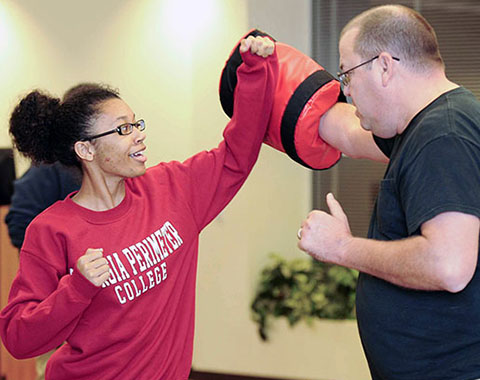
GPC Public Safety Officer Todd Wood instructs Brittaney Pugh during a self-defense training session offered to employees and students. (photo by Bill Roa)
Training, credentials make Public Safety the ‘real deal’
Georgia Perimeter College Public Safety Director Nicholas Marinelli Jr. isn’t eager to rest on his department’s proverbial laurels. Especially in the dynamic world of law enforcement, that could be a dangerous proposition.
Yet, even Marinelli welcomes accolades, such as GPC’s recent recognition by American School Search as one of the nation’s safest colleges.
He believes the designation is in great part a result of the college’s highly-trained and decidedly credentialed public safety department—an ardent focus for Marinelli since accepting the GPC chief of police post four years ago.
“The charge I got during my interview was simply this: ‘Chief, we’ve got 25,000 students, and we’re spread out over 65 miles. We’ve got to be able to ensure that public safety is a top priority,’” Marinelli recalls.
“So, I drafted my talent up against that mandate, which has given me a real-deal police department.”
For his part, Marinelli, who speaks at a fast clip and walks at an even faster pace, has an extensive law enforcement background. He came to GPC following 20 years serving in police leadership roles for the state of Georgia, city of Atlanta and DeKalb County. He even worked through the State Department to train Iraqi soldiers as police officers in Baghdad.
Recruiting experienced officers
From the beginning, one of Marinelli’s strategies for ramping up GPC’s safety team has included an ambitious recruiting drive.
Some of his recruits, such Sgt. Bart Hulsey, have been involved in high-profile criminal cases. Hulsey, a GPC alumnus and Mercer University graduate, spent 17 years as part of Gwinnett County’s Special Weapons and Tactics (SWAT) division. A major in the police department, he led the SWAT division for four years.
Nearly a decade ago, Hulsey’s team played a critical role in the capture of Brian Nichols, the Fulton County rape defendant who escaped from custody and then murdered the judge presiding over his trial, a court reporter, a sheriff’s deputy and a federal agent. Hulsey was commander of the Gwinnett SWAT team that captured and arrested Nichols’ in a Gwinnett apartment complex one day later.
Officer Kareem Pringle is another of GPC’s highly skilled law enforcers.
Last year, investigative work by Pringle and former Georgia Perimeter policeman Dondi Sumpter led to the Georgia Bureau of Investigation arrest of two murder suspects.
Christopher Sheppard and Constance Mason were charged in connection with the death of Alpha Diallo after an altercation spilled over onto GPC’s Clarkston Campus. Shepard pled guilty to voluntary manslaughter and was sentenced to 20 years, 15 years to serve. There is a bench warrant for Mason for failure to appear in court after she was indicted on charges of making false statements and concealing a death. Neither the suspects nor victim attended GPC.
Extra training for officers
Georgia state law mandates 20 hours of post-certification training annually for police, but GPC officers receive more than double that amount.
That’s because GPC public safety leaders have learned from campus tragedies such at the 2007 shootings at Virginia Tech.
“There have been a lot of [campus] incidents across the country that have been thwarted because agencies like us have taken these situations seriously and prepared for them,” Hulsey says.
“It’s not a matter that it can’t happen here, because we know it could happen here, and we train accordingly.”
Lt. Andy Moore, a former Marine and assistant commander in DeKalb County’s SWAT unit, agrees. Moore is a firearms instructor who heads up GPC public safety officers’ intensive training schedule.
One day, officers may focus on weapons qualifications, the next on preparation for an active campus shooter or domestic violence scenario.
It takes a village
Yet, even with the high level of training for GPC’s law enforcers, Moore stresses the importance of the entire college community assisting in the goal to keep campuses safe.
That’s why Moore and other public safety personnel frequently lead faculty, staff and students in fire drill, active shooter and combative defense trainings, among others. The department also posts online crime prevention videos and annually co-sponsors a domestic violence symposium.
In addition, public safety offers students, faculty and staff anytime escort services to vehicles parked on campus lots, which also are equipped with marked emergency call boxes.
“We try to impress upon the faculty and the staff that they’re also our eyes and our ears,” Moore says, emphasizing that anyone who sees suspicious activity should alert campus police immediately.
“We’re not out to get anybody,” he says. “But we are here to make everybody safe.”
GPC Customer Service Director Fran Mohr is part of a coordinated program to assist GPC public safety officers. She serves as a Clarkston Campus building coordinator, which means she’s the main point of contact for everyone in her building and the liaison between the public safety department and building occupants.
“We do have a fine, well-trained police department here at the campus,” Mohr says. “But they can’t be everywhere all the time; so if I could provide another set of eyes and ears and if I could pitch in during an emergency, this helps.”
